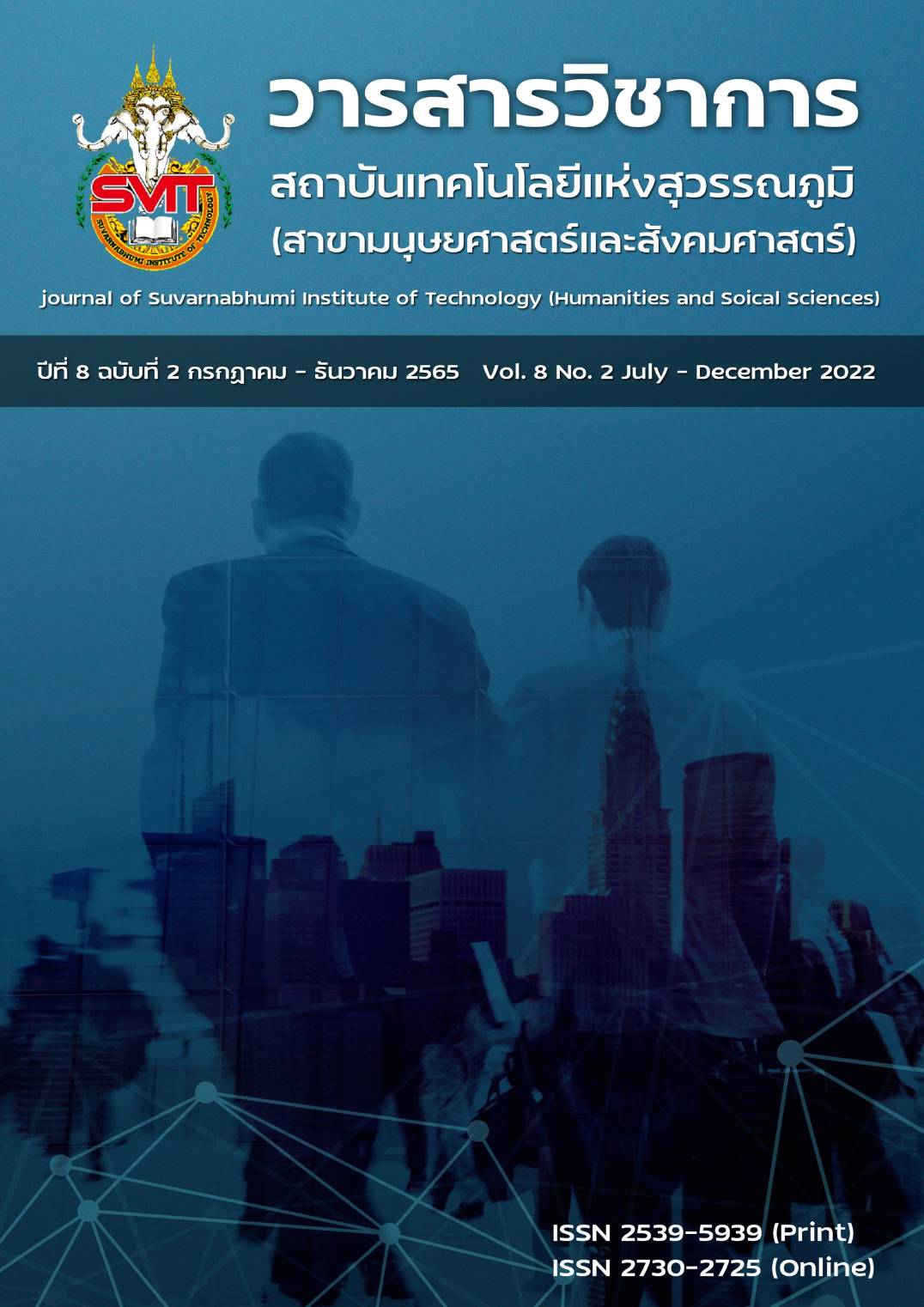A LEARNING MANAGEMENT MODELS TO DEVELOP LEARNIERS’ PRACTICAL SKILLS
Keywords:
Model, Learning Management, Practical Skill DevelopmentAbstract
This article is intended to present practical skills learning management techniques for applying in learning management for develop skills in learning activities and everyday activities by bringing the concepts or techniques of learning management in the practical skills of educators to present for teachers to be able to use in teaching and learning activities. The practical skills focus on practice using physical skills as a practical tool which can be synthesized into 7 steps of teaching practical skills, with the sequence of activities teaching practical skills, i.e. Step 1, checking the original skills or the basics that learners have acquired. Step2, the process explaining. Step3, the demonstration consists of explaining the sequence of steps of the practice slowly for the learners to observe only completed. Step 5, Self-practice without model under guidance of teachers. Step 6, Self-practice without model and without guidance, and Step 7, natural self-experience practice. And additionally improve practical skills to suit their own aptitude accordingly.
References
กมลวรรณ ตังธนกานนท์. (2557). การวัดและประเมินทักษะการปฏิบัติ. กรุงเทพฯ: โรงพิมพ์แห่งจุฬาลงกรณ์ มหาวิทยาลัย.
ทิศนา แขมมณี. (2556). ศาสตร์การสอน: องค์ความรู้เพื่อการจัดกระบวนการเรียนรู้ที่มีประสิทธิภาพ. กรุงเทพฯ: จุฬาลงกรณ์มหาวิทยาลัย.
ประวีนา เอี่ยมยี่สุ่น. (2564). การประเมินผลการเรียนรู้ด้านทักษะพิสัย. วารสารวิพิธพัฒนศิลป์บัณฑิตศึกษา, 1(2: พฤษภาคม – สิงหาคม)
ปรียาพร วงศ์อนุตรโรจน. (2555). การบริหารงานวิชาการ. กรุงเทพฯ: ศูนย์สื่อเสริมกรุงเทพ.
ปัญญา ไข่พรมราช. (2563). การพัฒนากิจกรรมการเรียนรู้ดนตรีไทยของนักเรียนชั้นมัธยมศึกษาปีที่ 2 ตามแนวคิดการพัฒนาทักษะของซิมพ์ซัน. วารสารมนุษยศาสตร์และสังคมศาสตร์ มหาวิทยาลัยนครพนม, 10(2:พฤษภาคม – สิงหาคม).
พยุงศักดิ์ จันทรสุรินทร์. (2565). นโยบายการปฏิรูปอาชีวศึกษา. สืบค้นจาก http://www.idis.ru.ac.th/ report/index/php?=557.0;wap
พลอยไพลิน นิลกรรณ์. (2562). แนวทางการจัดการเรียนรู้เชิงรุก (Active Learning). กลุ่มนิเทศติดตาม และประเมินผลการจัดการศึกษา สำนักงานเขตพื้นที่การศึกษามัธยมศึกษา เขต 35.
ไพบูลย์ เทวรักษ์. (2550). จิตวิทยาการเรียนรู้. กรุงเทพฯ: เอสดีเพรสการพิมพ์,
ไพโรจน์ ตีรณธนากุล, ไพบูลย์ เกียรติโกมล และเสกสรรค์ แย้มพินิจ. (2546). การออกแบบและ ผลิตบทเรียนคอมพิวเตอร์การสอน สำหรับ e-Learning. กรุงเทพฯ : ศูนย์สื่อเสริมกรุงเทพมหานคร
โรงเรียนวังจันทร์วิทยา. (2563). นวัตกรรมรูปแบบการจัดกระบวนการเรียนรู้ OLA (อัดสำเนา). ระยอง: โรงเรียนวังจันทร์วิทยา.
วิทวัฒน์ ขัตติยะมาน และฉัตรศิริ ปิยะพิมลสิทธิ์. (2565). การปรับปรุงจุดมุ่งหมายหมาย ทางการศึกษาของบลูม. สืบค้นจาก http://www. Watpon.com.
โสภา ชูพิกุลชัย. (2550). จิตวิทยาทั่วไป. กรุงเทพฯ: ไทยวัฒนาพานิช.
สุวิมล ว่องวาณิช. (2550). การวิจัยประเมินความต้องการจำเป็น. กรุงเทพฯ: สำนักพิมพ์แห่งจุฬาลงกรณ์มหาวิทยาลัย.
อภิชาติ อนุกูลเวช. (2551). การพัฒนารูปแบบการเรียนรู้การสอนฝึกปฏิบัติทางเทคนิคบนเครือข่ายอินเทอร์เน็ต สำหรับนักเรียนอาชีวศึกษา. (ปริญญานิพนธ์ดุษฎีบัณฑิต, มหาวิทยาลัยศรีนครินทรวิโรฒ)
Garrison, K.C. , and Magoon, R.(1972). Educational psychology. Ohio: Charles E. Morrill Publishing.
Klausmeier, H. J. and R. E. Ripple. (1971). Learning and Human Abilities: Educational Psychology. New York: Harper International Editions.
Page, G. (1977). International Dictionary of Education. Great Britain: The Anchor Press.
Simpson, R.D. (1972). Teaching Physical Education: A System Approach. Boston: Houghton.
Simpson, R. D. and D. K. Brown. (1977). Validating Science Teaching Competencies Using the Delphi: Method, Science Education, 61(6), 211 - 213.
Downloads
Published
Issue
Section
License
Copyright (c) 2022 Suvarnabhumi Institute of Technology

This work is licensed under a Creative Commons Attribution-NonCommercial-NoDerivatives 4.0 International License.
The articles published are copyrighted by the Sarasas Journal of Humanities and Social Science. The opinions expressed in each article in this academic journal are those of the individual authors and do not reflect the views of Sarasas Suvarnabhumi Institute of Technology. The authors are solely responsible for all aspects of their respective articles. Any errors or inaccuracies in the articles are the sole responsibility of the authors.



